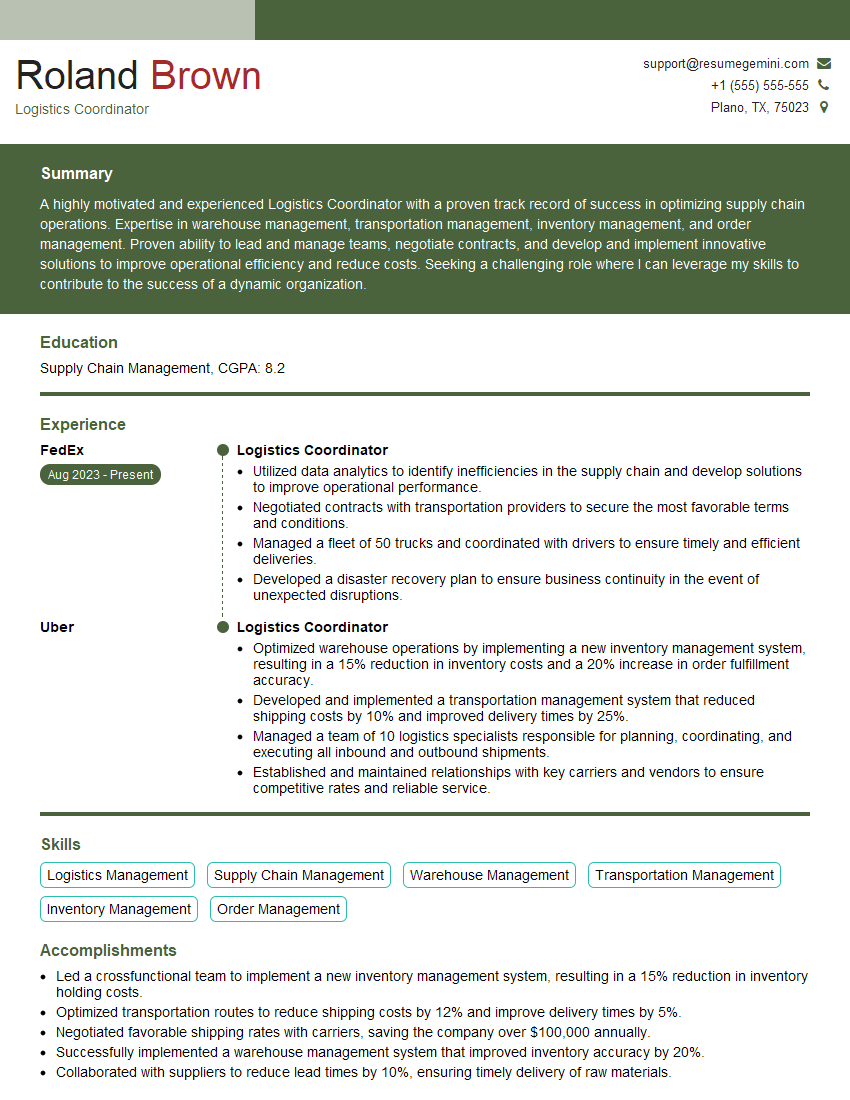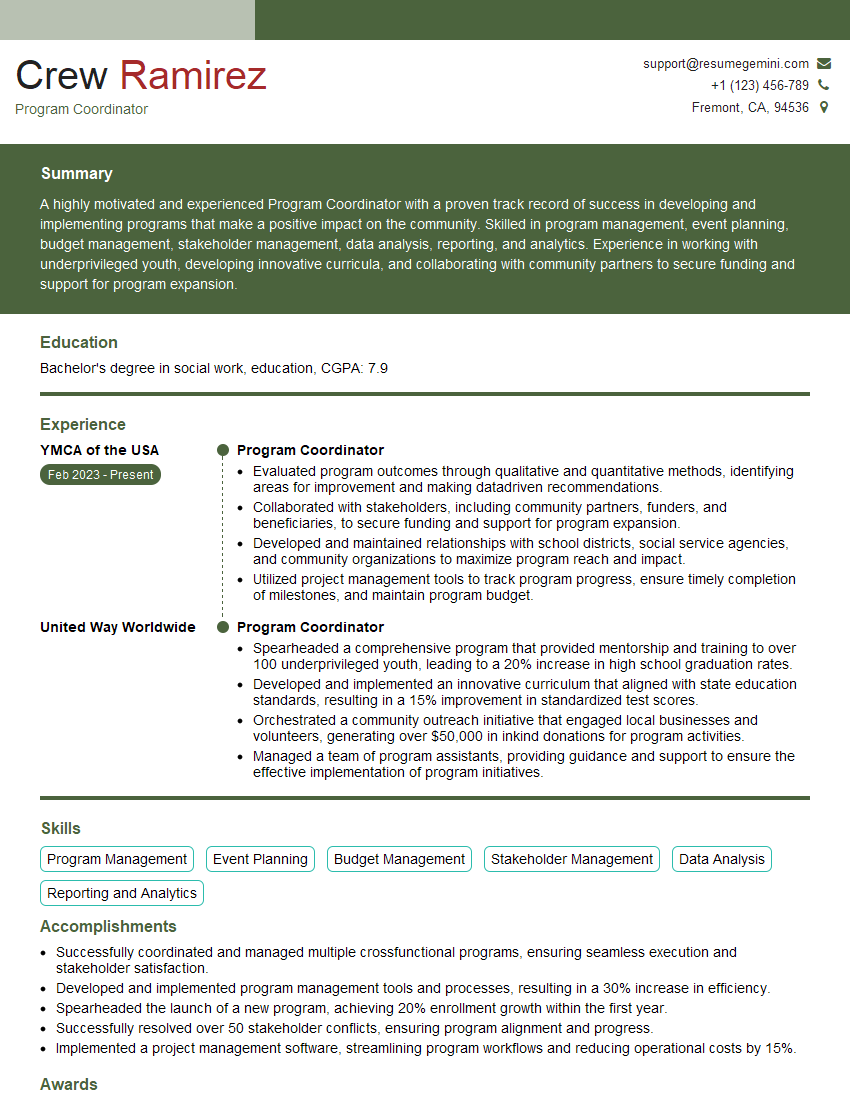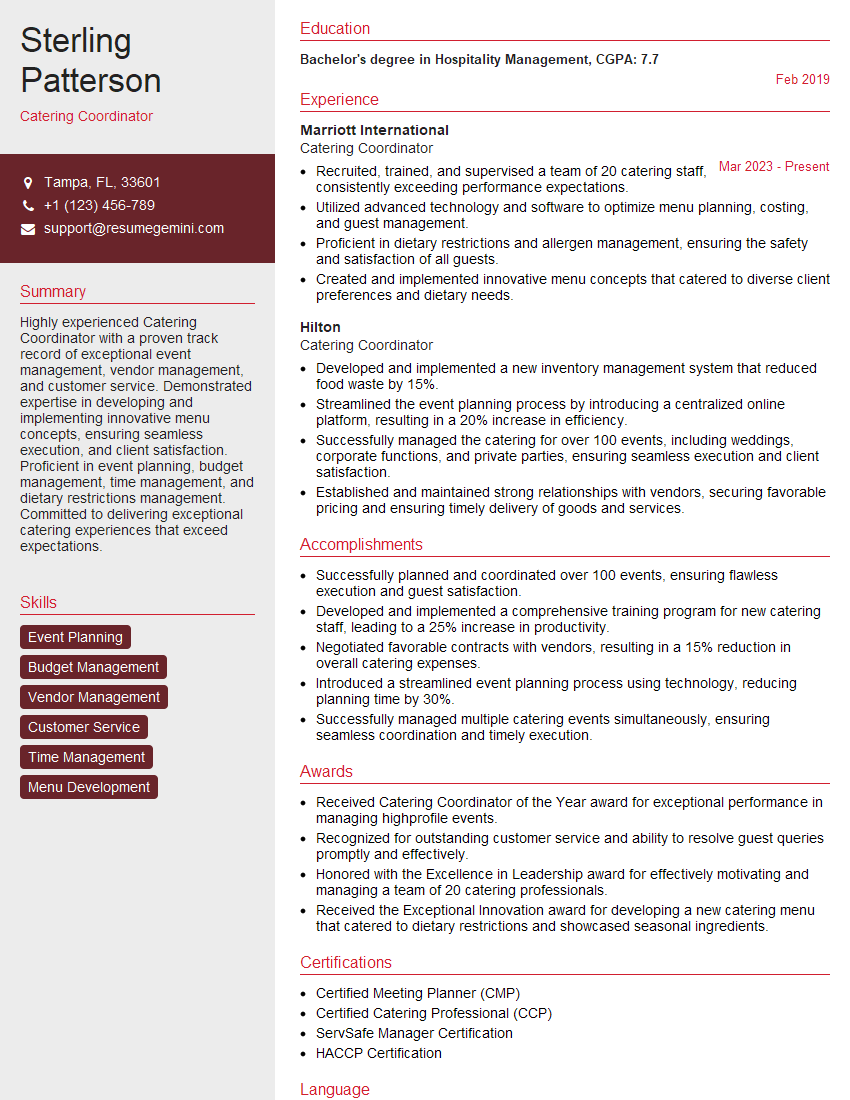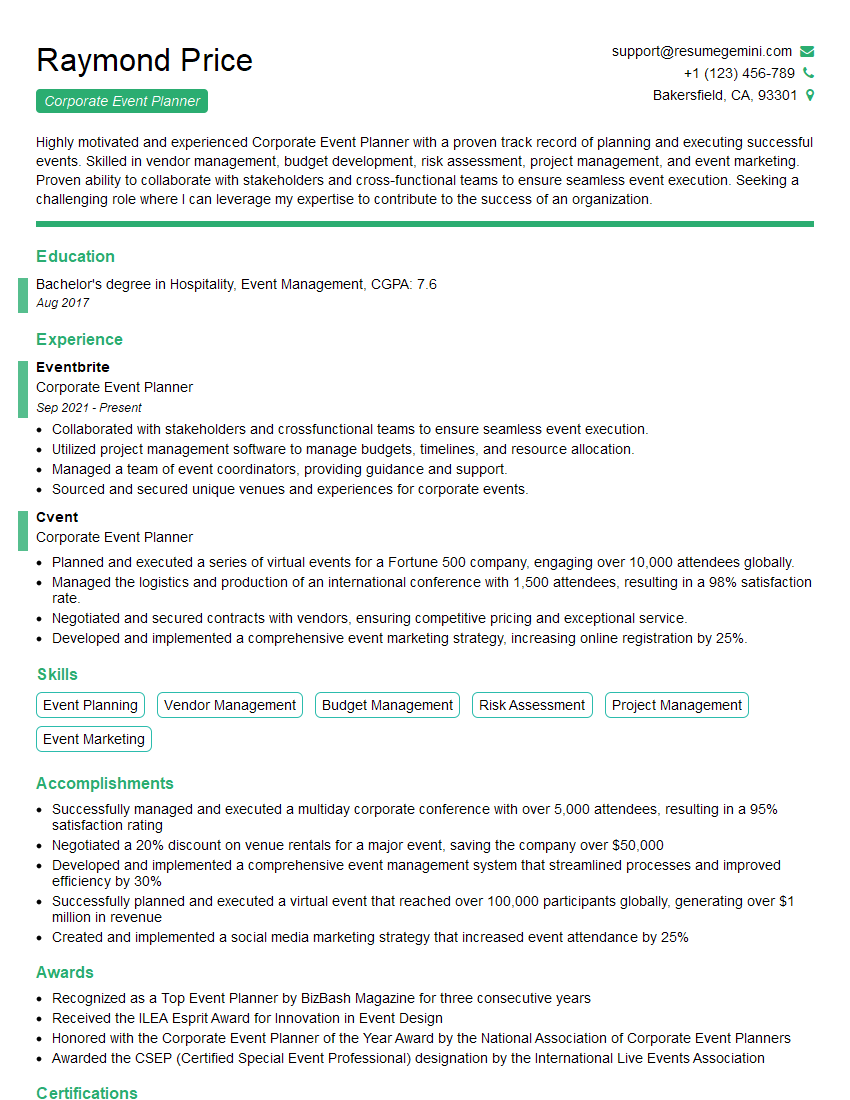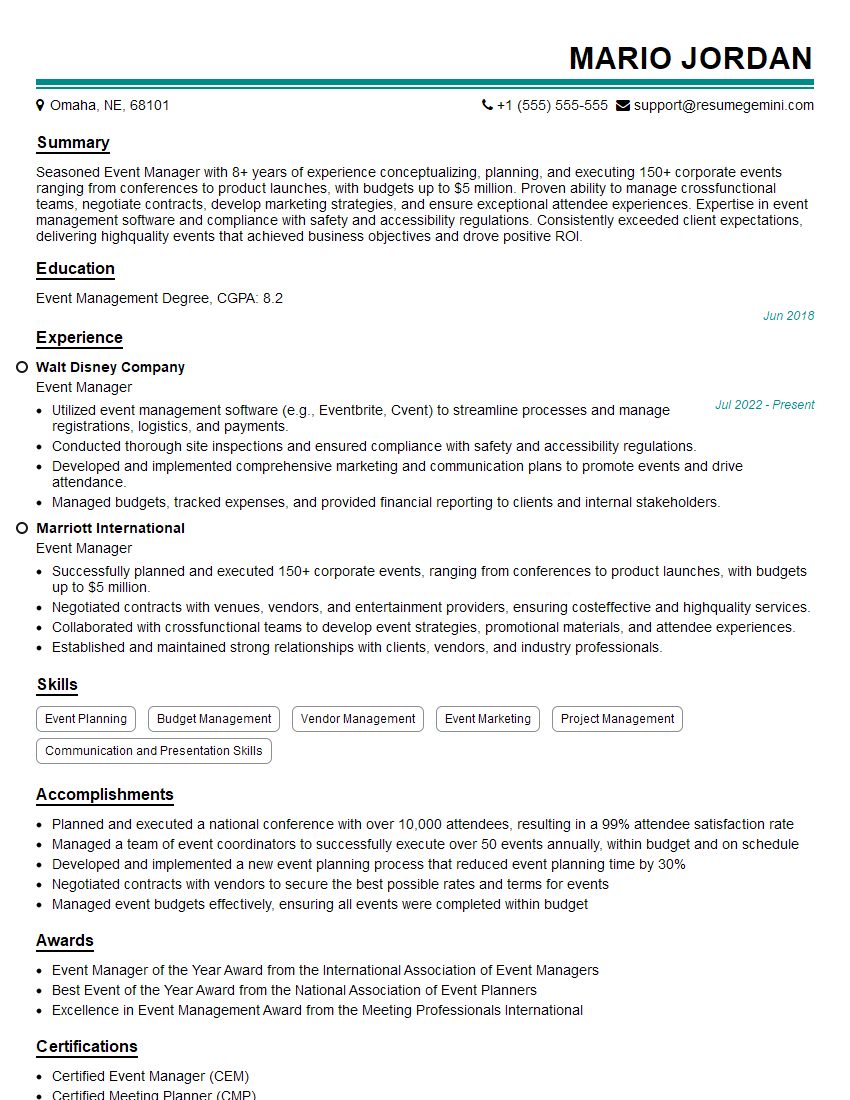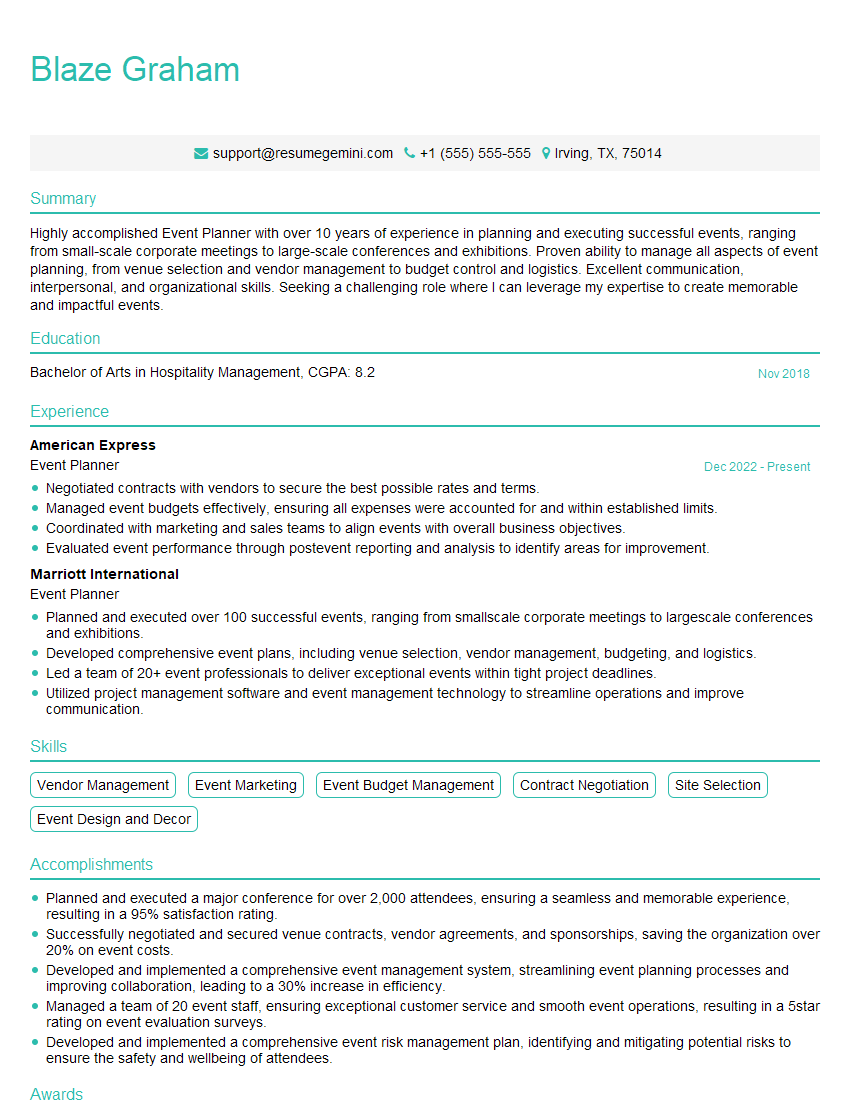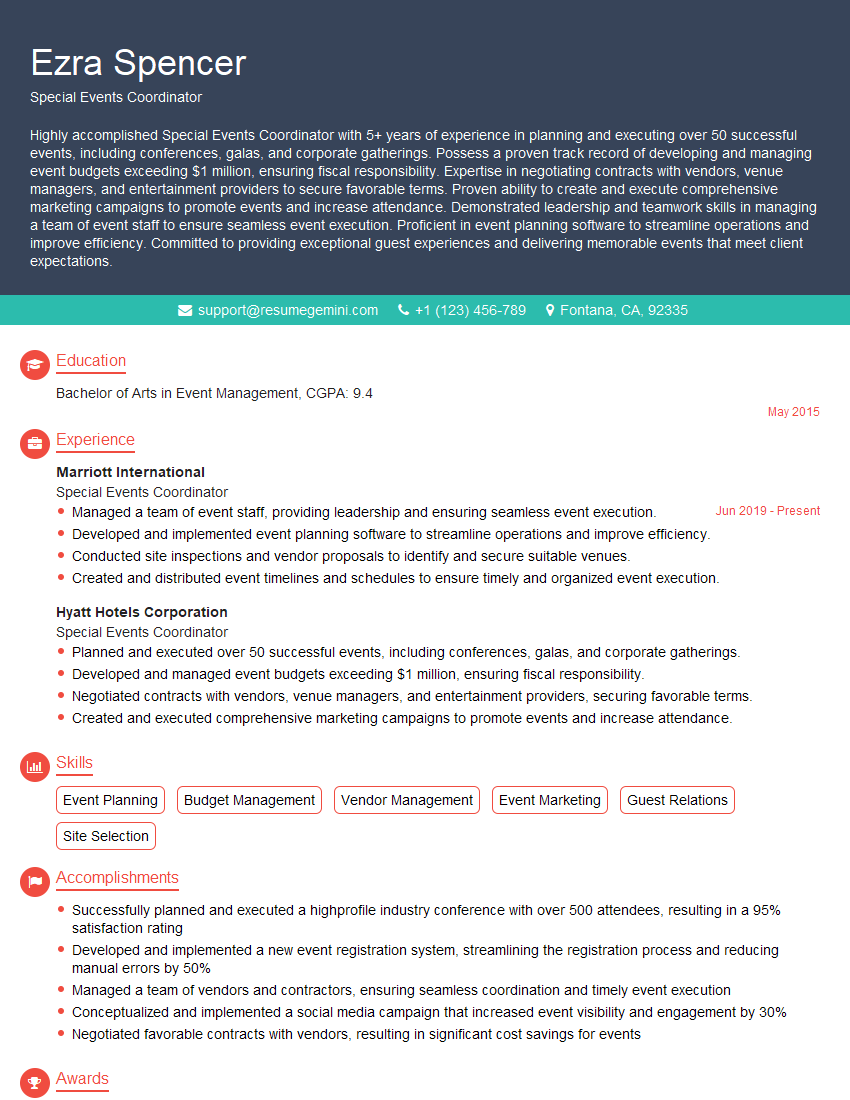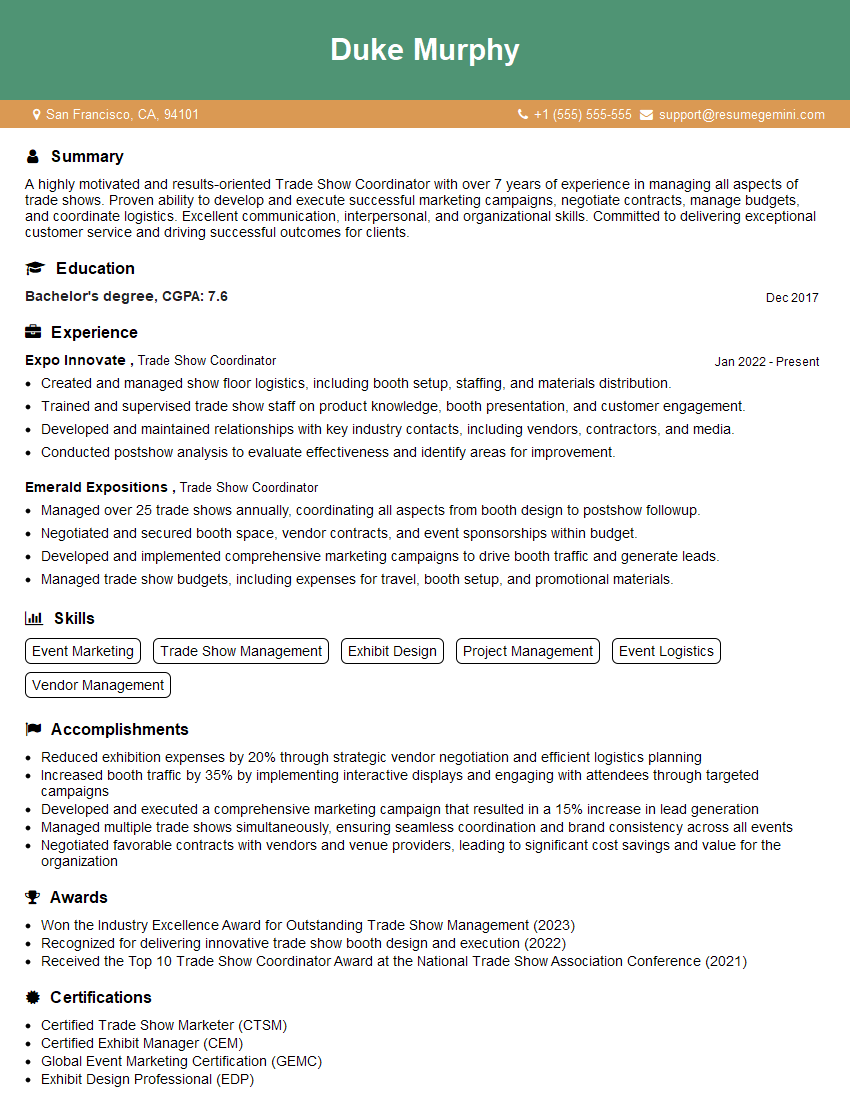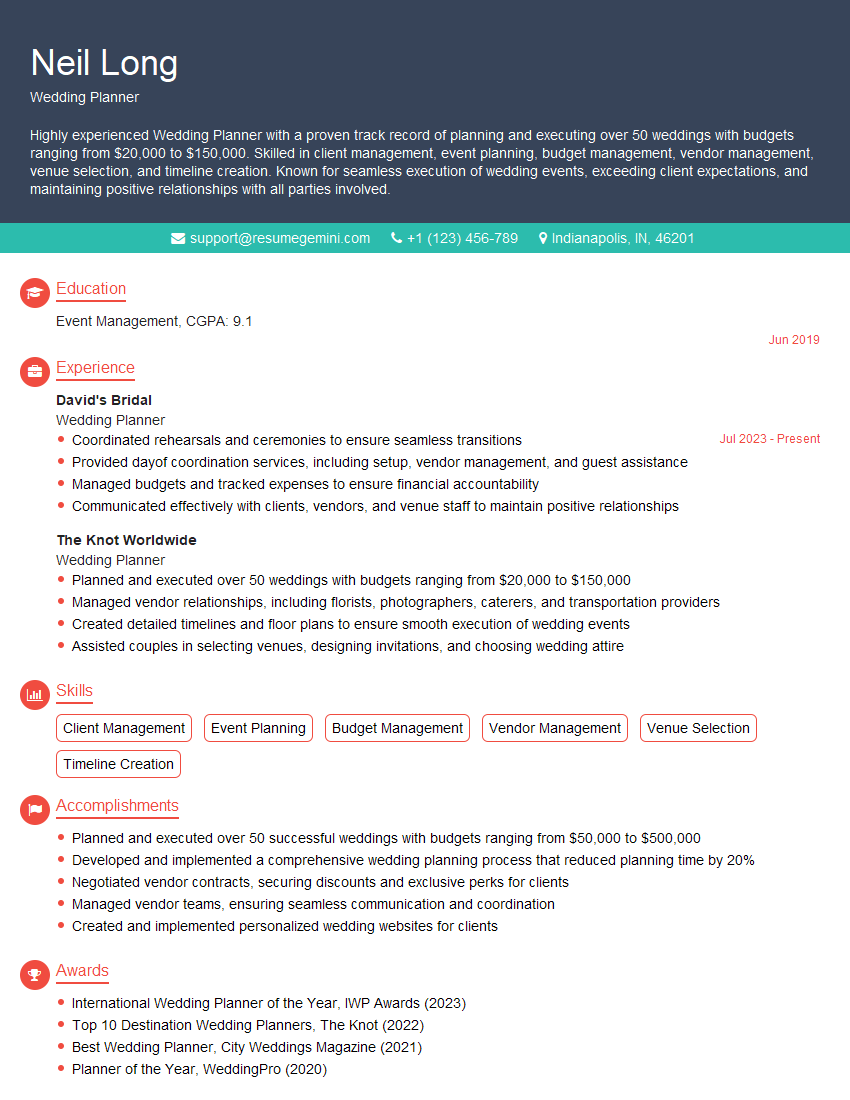Feeling uncertain about what to expect in your upcoming interview? We’ve got you covered! This blog highlights the most important Meeting and Event Coordination interview questions and provides actionable advice to help you stand out as the ideal candidate. Let’s pave the way for your success.
Questions Asked in Meeting and Event Coordination Interview
Q 1. Describe your experience managing budgets for events.
Budget management is crucial for successful events. It involves meticulous planning, tracking, and control of all financial aspects, from initial estimations to final reconciliation. My approach begins with a thorough understanding of the client’s objectives and the desired scope of the event. I then develop a detailed budget, categorizing expenses (venue, catering, marketing, entertainment, etc.) and allocating funds accordingly. This involves negotiating favorable rates with vendors and exploring cost-effective alternatives without compromising quality. Throughout the event planning process, I meticulously track expenses against the budget, generating regular reports to monitor progress and identify any potential overruns. For example, when planning a large corporate conference, I might initially allocate 30% of the budget to the venue, 25% to catering, 15% to marketing, and the remaining amount to other essentials. Regular monitoring allows for proactive adjustments, preventing financial surprises. I also build contingency funds to address unforeseen circumstances, protecting against unexpected cost increases or cancellations.
Q 2. How do you prioritize tasks during a high-pressure event?
Prioritizing tasks during a high-pressure event requires a calm and strategic approach. I utilize a combination of techniques, including the Eisenhower Matrix (urgent/important), to categorize tasks. This helps to focus on time-sensitive, critical items first. I also employ a project management approach, breaking down complex tasks into smaller, manageable steps. Clear communication with the team is key – delegating tasks effectively and ensuring everyone understands their roles and responsibilities. For instance, during a large-scale product launch, if a crucial speaker cancels last minute, my immediate priorities become finding a replacement speaker, updating the schedule, and informing attendees. This requires rapid decision-making and effective communication across all teams. Real-time problem-solving and adaptability are essential during such critical moments.
Q 3. What software or tools do you use for event planning and management?
I leverage a suite of software and tools for efficient event planning and management. These include project management platforms such as Asana or Monday.com for task assignment, collaboration, and progress tracking. For registration and ticketing, I utilize platforms like Eventbrite or Cvent, depending on the event’s scale and requirements. Spreadsheet software like Google Sheets or Excel are invaluable for budgeting, tracking expenses, and managing guest lists. Communication tools like Slack or Microsoft Teams facilitate seamless interactions with clients, vendors, and the internal team. Furthermore, I utilize specialized event planning software, such as Social Tables for floor plan design, and dedicated CRM systems for managing client relationships and communications.
Q 4. Explain your process for selecting vendors and negotiating contracts.
Vendor selection and contract negotiation are critical stages in event planning. My process begins with extensive research, identifying potential vendors based on their reputation, experience, and alignment with the event’s vision. I solicit detailed proposals, comparing pricing, services offered, and references. Thorough due diligence, including checking reviews and seeking references, is crucial. During contract negotiation, I focus on clarity and detail, ensuring all aspects of the agreement are clearly defined, including payment terms, cancellation policies, and liability clauses. I always aim for a win-win scenario, building strong relationships with vendors while safeguarding the event’s interests. For example, when selecting a caterer, I’ll compare menus, pricing, and service levels, verifying their capacity to handle the number of attendees. The final contract will explicitly specify the menu, guest count, service times, and payment schedule, leaving no room for ambiguity.
Q 5. How do you handle unexpected issues or crises during an event?
Handling unexpected issues requires a proactive, problem-solving approach. My first step is to assess the situation calmly and accurately. This includes identifying the problem’s scope and potential impact. Next, I assemble a team of relevant individuals, delegating tasks based on their expertise and availability. Clear communication is vital, keeping everyone informed and updated. For example, if a power outage occurs during an event, my team would immediately contact the venue’s technical staff, assess the extent of the disruption, and implement contingency plans – such as providing alternative lighting or rescheduling affected segments of the program. Post-incident reviews are conducted to analyze what happened, identify areas for improvement, and refine emergency procedures to prevent similar occurrences in the future.
Q 6. Describe your experience with event registration and ticketing systems.
My experience with event registration and ticketing systems spans various platforms, including Eventbrite, Cvent, and custom-built solutions. I understand the importance of choosing the right system based on the event’s size, complexity, and specific needs. This includes integrating with payment gateways for secure transactions, managing attendee data, and generating reports for tracking registrations and attendance. I’m familiar with the various features offered by different platforms, including custom branding, email marketing integration, and data analytics. For instance, when managing a large conference, I’d utilize Cvent’s robust features to handle thousands of registrations, manage waiting lists, and generate detailed reports on attendee demographics and feedback. I also emphasize data security and compliance with privacy regulations when selecting and utilizing any registration platform.
Q 7. How do you ensure effective communication with clients, vendors, and attendees?
Effective communication is the cornerstone of successful event planning. I utilize multiple channels to communicate with clients, vendors, and attendees, tailoring my approach to each audience. With clients, I maintain regular updates through email, phone calls, and in-person meetings, sharing progress reports and addressing any concerns proactively. With vendors, I use email, phone calls, and project management software to coordinate logistics, deliverables, and payment schedules. For attendees, I employ email marketing, social media, and event apps to disseminate information, provide updates, and address questions. A consistent communication strategy ensures everyone stays informed, contributing to a smooth and successful event. For example, I might use email blasts for general announcements, a dedicated event app for real-time updates and interactive features, and social media to create engagement and build anticipation leading up to the event.
Q 8. What metrics do you use to measure the success of an event?
Measuring event success goes beyond simply counting attendees. It requires a multi-faceted approach, using key performance indicators (KPIs) tailored to the event’s specific objectives. For instance, a marketing conference might prioritize lead generation, while a team-building retreat might focus on employee engagement.
- Attendance and Engagement: This includes the number of registered attendees, actual attendance rate, and level of participation in activities (e.g., survey completion rates, Q&A participation). For example, a high registration rate but low attendance suggests problems with communication or event appeal.
- Net Promoter Score (NPS): This metric measures attendee satisfaction and loyalty, providing insights into overall experience and the likelihood of future participation or referrals. A high NPS indicates a successful and memorable event.
- Return on Investment (ROI): This is crucial for sponsored events or those with a clear business objective. It involves calculating the cost of the event against the revenue generated or achieved business goals (e.g., sales leads, brand awareness). For example, calculating the cost per lead generated.
- Social Media Engagement: Monitoring social media mentions, hashtag usage, and sentiment analysis can provide valuable qualitative data on attendee perception and event reach. A high volume of positive posts indicates successful brand messaging and engagement.
- Achievement of Objectives: Finally, we must evaluate whether the event achieved its predefined goals. Did the training event improve employee skills? Did the product launch generate the desired sales leads? This is the ultimate measure of success.
Q 9. How do you manage attendee expectations and feedback?
Managing attendee expectations and feedback is a continuous process that starts long before the event and extends well beyond its conclusion. It’s about setting realistic expectations, actively soliciting feedback, and demonstrating responsiveness.
- Pre-Event Communication: Clear and consistent communication is key. This includes detailed event agendas, FAQs, travel instructions, and pre-event surveys to understand attendees’ needs and expectations.
- On-Site Engagement: During the event, ensure easy access to support staff, clear signage, and opportunities for questions and feedback. Live polls and Q&A sessions can provide immediate insights.
- Post-Event Surveys: Post-event surveys provide invaluable feedback. These should be concise, targeted, and include a mix of quantitative (rating scales) and qualitative (open-ended) questions. For example: “On a scale of 1-5, how satisfied were you with the speaker’s presentation?” “What did you enjoy most about the event? What could be improved?”
- Follow-up and Action: Addressing concerns promptly and demonstrating that feedback is being used to improve future events is crucial. A simple thank you email acknowledging their participation and indicating the next steps based on their feedback strengthens engagement.
Q 10. Describe your experience with risk assessment and mitigation in event planning.
Risk assessment is an integral part of event planning. It involves identifying potential problems, analyzing their likelihood and impact, and developing mitigation strategies. Think of it like a pre-flight checklist for your event.
- Identify Potential Risks: This could involve anything from venue issues (e.g., power outages, accessibility problems) to speaker cancellations, poor weather, or even security threats. Brainstorming sessions with the team can be highly effective.
- Assess Likelihood and Impact: Each identified risk is assessed for its likelihood of occurrence and the potential impact on the event. A risk matrix can be used to prioritize risks based on severity.
- Develop Mitigation Strategies: For each high-risk item, develop a clear mitigation plan. This might involve securing backup venues, having contingency speakers, purchasing event insurance, or implementing robust security measures. For example, if a speaker cancels, having a backup speaker ready minimizes disruption.
- Contingency Planning: Create detailed contingency plans for various scenarios. These should outline the steps to be taken in case of unforeseen events. For instance, having a communication strategy ready in case of emergency evacuations.
- Regular Review: Risks should be monitored and reassessed throughout the planning process. Changes in circumstances may necessitate adjustments to the mitigation plans.
Q 11. How do you create and manage an event timeline?
Creating and managing an event timeline is essential for effective planning and execution. It provides a visual representation of all tasks and deadlines, ensuring that everything runs smoothly. I typically use project management software like Asana or Monday.com, but even a simple Gantt chart can be highly effective.
- Define Key Milestones: Start by identifying all major milestones, such as the event date, registration deadlines, speaker confirmations, venue booking, marketing campaigns, and post-event activities.
- Break Down Tasks: Each milestone is then broken down into smaller, more manageable tasks. For example, “Venue booking” might include finding venues, getting quotes, negotiating contracts, and securing deposits.
- Assign Responsibilities: Assign specific tasks to team members or vendors. Clearly define roles and responsibilities to ensure accountability.
- Set Deadlines: Establish realistic deadlines for each task, considering dependencies and potential delays. Use a visual timeline to illustrate task sequencing and deadlines.
- Monitor Progress: Regularly monitor progress against the timeline, identifying and addressing any potential delays proactively. Regular team meetings are crucial for tracking progress and making necessary adjustments.
Q 12. What is your experience with post-event reporting and analysis?
Post-event reporting and analysis are critical for evaluating success, identifying areas for improvement, and informing future events. This involves collecting and analyzing data from various sources.
- Data Collection: This includes gathering data from registration forms, surveys, social media monitoring, financial records, and attendance tracking.
- KPI Analysis: Analyze the key performance indicators (KPIs) identified before the event, comparing actual results against targets. For example, compare the actual attendance rate to the projected rate, analyze survey results to identify strengths and weaknesses, and evaluate ROI.
- Qualitative Feedback Review: Analyze qualitative feedback from surveys and social media to understand attendee sentiment and identify areas for improvement. Look for recurring themes and patterns.
- Report Generation: Create a comprehensive report summarizing the event’s performance, highlighting key findings, and providing recommendations for future events.
- Actionable Insights: The most important aspect is using the analysis to make actionable changes. What improvements can be made to the event format, marketing strategy, or logistical aspects based on the data and feedback?
Q 13. Describe your experience with different event formats (e.g., virtual, hybrid, in-person).
I have extensive experience with various event formats, each presenting unique challenges and opportunities.
- In-Person Events: These require meticulous logistical planning, including venue selection, catering, AV equipment, and on-site support. The focus is on creating a memorable and engaging in-person experience.
- Virtual Events: Virtual events leverage technology to create engaging online experiences. Key considerations include platform selection, interactive elements, technical support, and ensuring accessibility for all participants. Tools like Zoom, Hopin, or similar platforms are crucial.
- Hybrid Events: Hybrid events combine in-person and virtual elements, offering greater reach and flexibility. They demand careful coordination of both on-site and online components, ensuring a seamless experience for all participants. This requires thoughtful design to cater to both audiences simultaneously.
In each format, attendee engagement is paramount. I leverage interactive elements such as Q&A sessions, polls, breakout rooms (virtual), and networking opportunities (both in-person and virtual) to foster participation and create a sense of community.
Q 14. How do you ensure the accessibility of your events?
Ensuring accessibility is not just ethically sound but also legally crucial in many jurisdictions. It’s about creating an inclusive environment where all attendees, regardless of ability, can fully participate.
- Venue Accessibility: Choose venues with accessible entrances, restrooms, seating, and assistive listening devices. Confirm compliance with ADA guidelines (or equivalent) and verify accessibility features.
- Communication Accessibility: Provide materials in accessible formats, such as large print, Braille, or audio versions. Use clear and concise language, avoiding jargon. Consider live captioning and transcripts for virtual events.
- Technology Accessibility: Ensure that any technology used during the event is accessible, using screen readers, keyboard navigation, and alternative text for images. Test for accessibility prior to the event.
- Dietary Restrictions and Allergies: Provide options for attendees with dietary restrictions or allergies when catering. Clearly communicate these options beforehand.
- Support Staff: Have trained staff available to provide assistance to attendees with disabilities, addressing any specific needs that might arise.
Proactive communication and collaboration with attendees regarding their accessibility needs are key to creating a truly inclusive and welcoming event.
Q 15. How do you manage event marketing and promotion?
Event marketing and promotion is crucial for attracting attendees and achieving event objectives. My approach is multifaceted, encompassing a blend of digital and traditional strategies tailored to the specific event and target audience.
- Digital Marketing: This includes targeted social media campaigns across platforms like Facebook, Instagram, LinkedIn, and Twitter; Search Engine Optimization (SEO) to improve organic search rankings; pay-per-click (PPC) advertising on search engines and social media; email marketing for pre-event reminders, post-event follow-ups, and promotional offers; and potentially influencer marketing to leverage the reach of relevant individuals within the target demographic. I carefully track key performance indicators (KPIs) such as website traffic, social media engagement, and conversion rates to optimize campaigns in real-time.
- Traditional Marketing: Depending on the event, this might involve print advertising in relevant publications, partnerships with local businesses for cross-promotion, public relations efforts to secure media coverage, and direct mail campaigns.
- Content Marketing: Creating valuable and engaging content such as blog posts, articles, infographics, and videos, is essential. This content not only attracts attendees but also positions the event as a thought leader within its industry.
For example, in a recent technology conference, I leveraged LinkedIn extensively, targeting professionals in the tech sector through sponsored posts and group discussions. We also partnered with a relevant tech magazine for a print advertisement and secured coverage in a major technology news outlet.
Career Expert Tips:
- Ace those interviews! Prepare effectively by reviewing the Top 50 Most Common Interview Questions on ResumeGemini.
- Navigate your job search with confidence! Explore a wide range of Career Tips on ResumeGemini. Learn about common challenges and recommendations to overcome them.
- Craft the perfect resume! Master the Art of Resume Writing with ResumeGemini’s guide. Showcase your unique qualifications and achievements effectively.
- Don’t miss out on holiday savings! Build your dream resume with ResumeGemini’s ATS optimized templates.
Q 16. What is your experience with event technology and its integration?
I have extensive experience integrating event technology to streamline processes and enhance the attendee experience. This ranges from registration and ticketing systems to on-site event apps and audience engagement tools.
- Registration & Ticketing: I’m proficient in using platforms like Eventbrite, Cvent, and others to manage registrations, ticketing, and attendee data. This includes integrating payment gateways and automating communication processes.
- Event Apps: I leverage event apps to provide attendees with schedules, speaker information, maps, networking opportunities, and interactive features. This improves the overall event experience and reduces the need for printed materials.
Example: Using an app to allow attendees to schedule meetings with exhibitors or speakers. - Audience Engagement Tools: Tools like live polling, Q&A platforms, and social media walls increase audience participation and create a more interactive atmosphere. I also ensure these tools are seamlessly integrated with the overall event flow.
- Data Analytics: I utilize the data collected through event technology to analyze attendee behavior, measure the success of various marketing campaigns, and inform future event planning decisions.
For a large-scale conference I managed, the event app facilitated real-time feedback surveys, which allowed us to address any issues immediately and optimize future iterations.
Q 17. How do you handle conflicts or disagreements among team members?
Conflict resolution is a vital skill in event coordination. My approach focuses on open communication, active listening, and finding mutually beneficial solutions.
- Open Communication: I encourage team members to express their concerns openly and honestly in a safe and respectful environment. I ensure everyone feels heard and understood.
- Active Listening: I actively listen to each person’s perspective, acknowledging their feelings and viewpoints before attempting to offer solutions.
- Collaborative Problem Solving: I facilitate a collaborative discussion to identify the root cause of the conflict and brainstorm solutions together. The goal is to find a resolution that works for everyone involved.
- Mediation (if needed): In some cases, I might act as a mediator, helping team members communicate effectively and reach a compromise. I avoid taking sides and focus on facilitating a productive discussion.
- Documentation: I meticulously document any agreements reached, ensuring everyone is on the same page and understands their responsibilities moving forward.
For example, I once mediated a disagreement between the design team and the marketing team about the event’s branding. Through open communication and collaborative brainstorming, we arrived at a compromise that satisfied both teams.
Q 18. Describe your experience with contract negotiation and vendor management.
Contract negotiation and vendor management are critical for ensuring successful event execution and budget adherence. My experience spans reviewing, negotiating, and managing contracts with a variety of vendors including venues, caterers, AV technicians, and entertainment providers.
- Contract Review: Before signing any contract, I thoroughly review all terms and conditions, ensuring they align with the event’s requirements and budget. I pay close attention to clauses related to payment schedules, liability, cancellation policies, and intellectual property rights.
- Negotiation: I negotiate favorable terms with vendors, aiming to secure the best value while maintaining quality. This involves leveraging my knowledge of market rates and negotiating key aspects such as pricing, deliverables, and timelines.
- Vendor Management: I maintain clear communication with vendors throughout the event planning process, providing regular updates and addressing any concerns promptly. I establish clear expectations and deadlines, ensuring everyone is aligned and working towards the same goals.
- Relationship Building: I build strong relationships with reliable vendors, fostering long-term partnerships that benefit both parties. This often leads to more favorable terms and better service in future events.
For instance, I successfully negotiated a lower rate with a venue by highlighting the long-term potential for future events. This saved the event considerable funds.
Q 19. How do you ensure compliance with legal and safety regulations during events?
Ensuring compliance with legal and safety regulations is paramount for event safety and avoiding potential liabilities. My approach involves proactive planning and meticulous execution.
- Risk Assessment: I conduct a thorough risk assessment early in the planning phase, identifying potential hazards and developing mitigation strategies. This might include crowd management plans, emergency procedures, and security protocols.
- Permitting & Licensing: I ensure all necessary permits and licenses are obtained well in advance of the event, adhering to local and national regulations.
- Safety Regulations: I meticulously ensure compliance with all relevant safety regulations, including fire safety codes, accessibility standards (ADA), and food safety requirements. This may involve working with specialized consultants or inspectors.
- Insurance: I work with insurance brokers to secure appropriate event insurance coverage, protecting against potential liabilities such as accidents, injuries, or property damage.
- Emergency Preparedness: I develop detailed emergency plans, including procedures for evacuation, first aid, and communication during emergencies. I conduct regular training with event staff on these procedures.
For example, before a large outdoor festival, I worked with local authorities to ensure all necessary permits were obtained and implemented a detailed crowd management plan to prevent overcrowding and ensure safe access and egress.
Q 20. What is your process for developing an event budget?
Developing a realistic and comprehensive event budget is a critical step in ensuring successful event execution. My process involves detailed planning and meticulous tracking of all expenses.
- Define Objectives & Scope: The first step involves clearly defining the event’s objectives and scope. This determines the resources and activities required.
- Cost Estimation: I meticulously estimate all potential costs, including venue rental, catering, A/V equipment, marketing, staffing, entertainment, and any other relevant expenses. I use historical data and vendor quotes to inform these estimations.
- Contingency Planning: I always include a contingency buffer (typically 10-15%) to account for unforeseen expenses or cost overruns.
- Prioritization: I prioritize expenses based on their importance to the event’s success, ensuring the most critical items are adequately funded.
- Budget Approval: The budget is reviewed and approved by relevant stakeholders before proceeding with event planning.
I utilize spreadsheet software (like Excel or Google Sheets) to create a detailed budget breakdown, categorizing expenses and tracking actual spending against the projected budget. For example, a separate line item for ‘unforeseen expenses’ ensures flexibility and prevents overspending.
Q 21. How do you track expenses and manage financial resources?
Tracking expenses and managing financial resources effectively is crucial for maintaining budget control and ensuring financial transparency. My process utilizes a combination of software and manual tracking.
- Expense Tracking Software: I utilize accounting software or dedicated expense tracking apps to record all expenses, categorize them, and generate financial reports. This provides real-time visibility into spending patterns.
- Detailed Invoices & Receipts: I meticulously maintain all invoices and receipts, ensuring they are properly filed and easily accessible for audits or reconciliation.
- Regular Budget Reviews: I conduct regular budget reviews to compare actual spending against the projected budget. This allows for early identification of any variances and the implementation of corrective measures.
- Financial Reporting: I prepare regular financial reports for stakeholders, providing insights into the event’s financial performance. This includes income statements, expense reports, and profit/loss summaries.
- Reconciliation: I reconcile bank statements and credit card statements regularly to ensure accuracy and identify any discrepancies.
For example, using project management software like Asana, integrated with expense tracking tools, creates a centralized system, streamlining financial reporting and reducing administrative burdens. This transparency facilitates data-driven decision-making for future events.
Q 22. Describe your experience with site selection and venue management.
Site selection and venue management are critical to a successful event. It’s about finding the perfect location that aligns with the event’s objectives, budget, and attendee expectations. My process begins with a thorough understanding of the event’s needs – the number of attendees, required space (e.g., breakout rooms, exhibition hall), technical requirements (audio-visual, internet access), and desired ambiance.
I then research potential venues, considering factors like location accessibility (proximity to transportation hubs, parking), capacity, cost (including rental fees, catering options, and potential additional charges), and available amenities. I often utilize online venue finding platforms and network with local event venues to explore options. For example, for a large corporate conference, I might prioritize a hotel with ample meeting rooms, on-site catering, and easy access to an airport. For a smaller, more intimate workshop, a boutique hotel or a unique venue with a specific character might be more suitable.
Once a shortlist is created, I conduct site visits to assess each venue firsthand, evaluating its suitability against the event’s requirements. This includes verifying the availability of requested dates, inspecting the facilities, and negotiating contracts. Post-selection, venue management involves coordinating with the venue staff on all aspects of the event, from setup and logistics to ensuring smooth operations during the event and managing any arising issues.
Q 23. How do you manage event logistics, such as transportation and accommodation?
Managing event logistics, specifically transportation and accommodation, requires meticulous planning and coordination. For transportation, I first assess the attendees’ needs – are they primarily local, or will many be traveling from out of town? This informs the transportation strategy. I might arrange shuttle services from the airport or train station to the venue, coordinate car rentals, or even negotiate discounted group rates with transportation companies. Clear communication is key, ensuring attendees receive detailed travel information well in advance.
Accommodation management involves securing room blocks at hotels near the venue, negotiating group rates, and managing room reservations. I utilize online booking platforms or work directly with hotels to manage room allotments and handle any changes or cancellations. I ensure that the chosen accommodations align with the event’s budget and provide attendees with comfortable and convenient stay options. For example, for an international conference, I might secure a variety of accommodation options to cater to different budgets and preferences. Detailed information about accommodation choices, including booking links and reservation deadlines, are communicated clearly to attendees.
Q 24. What is your experience with developing and implementing event marketing strategies?
Developing and implementing effective event marketing strategies is crucial for attracting the target audience. I typically begin by defining clear marketing goals – such as increasing registrations, enhancing brand awareness, or generating leads. This informs the marketing channels and messaging used.
My strategies often involve a multi-channel approach, incorporating digital marketing (social media campaigns, email marketing, website optimization, paid advertising), traditional marketing (print materials, press releases), and potentially public relations efforts. For instance, a targeted social media campaign utilizing relevant hashtags and engaging content is crucial for reaching the desired demographic. For a professional conference, we might leverage industry publications and online forums. I carefully track key performance indicators (KPIs), such as website traffic, social media engagement, and registration numbers, to measure the effectiveness of our strategies and make adjustments as needed. A/B testing different marketing materials helps optimize campaign performance and ensures maximum impact.
Q 25. How do you measure and evaluate the ROI of an event?
Measuring and evaluating the ROI of an event involves carefully tracking both costs and revenue generated. It’s not just about the bottom line; it also considers the intangible benefits achieved.
I start by defining clear, measurable goals before the event, such as lead generation, brand awareness increase, or sales conversions. Then, I track key metrics throughout and after the event. This includes registration fees, sponsorship revenue, and any sales made during or following the event. Additionally, we assess post-event surveys to gauge attendee satisfaction and measure the achievement of our intangible goals. We often utilize a combination of quantitative and qualitative data. For example, we might calculate the cost per lead to assess the effectiveness of our marketing efforts, or analyze post-event feedback to understand how the event impacted brand perception.
A comprehensive ROI calculation considers all costs – venue rental, marketing, catering, speakers’ fees, staff, etc. – and compares them to the revenue generated and the value of intangible benefits (e.g., increased brand awareness, enhanced stakeholder relationships). This calculation helps demonstrate the event’s overall effectiveness and justify future investments.
Q 26. Describe your experience with event sustainability and environmental responsibility.
Event sustainability and environmental responsibility are increasingly important considerations. I integrate sustainable practices throughout the entire event planning process, from venue selection to waste management.
My approach includes choosing eco-friendly venues that prioritize sustainability initiatives. We opt for venues with green certifications or those demonstrating commitment to reducing their environmental footprint. Sustainable catering options – locally sourced food, reduced food waste, and biodegradable packaging – are prioritized. We minimize paper usage by utilizing digital registration and event materials whenever possible and promote attendee use of public transport or carpooling. Waste reduction strategies are implemented, including recycling and composting programs. For instance, we might partner with local charities to donate leftover food and supplies after the event. Post-event, we track our sustainability performance and strive for continuous improvement. Transparency in our sustainability efforts is also important, often communicating our commitment to attendees and stakeholders.
Q 27. How do you adapt to changing event needs and priorities?
Adaptability is crucial in event planning. Unexpected challenges are inevitable, so flexibility is key. I utilize a proactive approach, anticipating potential issues and developing contingency plans. For example, having backup venues in place or alternative speakers lined up is essential. Regular communication with all stakeholders ensures everyone is informed of any changes. I foster a collaborative environment, where adjustments are made openly and efficiently.
Utilizing project management tools allows me to track progress, identify potential roadblocks, and make necessary changes promptly. My approach involves regularly reviewing the event plan, adapting it as needed based on feedback, unforeseen circumstances, or shifting priorities. I remain open to new ideas and suggestions from the team and clients, ensuring the event’s evolution meets changing circumstances and remains aligned with its primary objectives.
Q 28. What is your approach to continuous improvement in event planning and management?
Continuous improvement in event planning is an ongoing process. I actively seek feedback from attendees, sponsors, and the event team to identify areas for enhancement. Post-event surveys, focus groups, and informal feedback sessions provide valuable insights into what worked well and what could be improved. I meticulously analyze data from different sources, including registration numbers, attendee engagement metrics, and financial reports, to understand the event’s overall performance.
Regularly attending industry conferences and workshops, staying updated on new technologies and best practices, and reading relevant publications helps me stay informed about innovative approaches. We analyze past event data to identify trends and areas where we can streamline processes or optimize resource allocation. We document all processes and best practices, creating a knowledge base that informs future event planning. This ensures we consistently deliver high-quality events that meet our clients’ needs and surpass expectations.
Key Topics to Learn for Meeting and Event Coordination Interview
- Budget Management: Understanding budgeting principles, cost tracking, and negotiation with vendors. Practical application: Creating and managing a detailed budget for a large-scale conference, including contingency planning.
- Venue Selection and Negotiation: Identifying suitable venues based on event requirements, negotiating contracts, and managing site visits. Practical application: Comparing bids from multiple venues and selecting the most cost-effective and suitable option based on capacity, amenities, and location.
- Logistics and Operations: Managing event logistics including registration, catering, AV equipment, transportation, and on-site support. Practical application: Developing a detailed event timeline and coordinating all logistical aspects to ensure seamless execution.
- Risk Management and Contingency Planning: Identifying potential risks and developing strategies to mitigate them. Practical application: Creating a comprehensive risk assessment document and developing backup plans for potential issues such as inclement weather or speaker cancellations.
- Marketing and Promotion: Developing effective marketing strategies to attract attendees. Practical application: Creating marketing materials and utilizing social media to promote the event.
- Technology Integration: Utilizing event management software and other technological tools to streamline event planning and execution. Practical application: Selecting and implementing appropriate software for registration, ticketing, and communication.
- Post-Event Analysis and Reporting: Evaluating event success through data analysis and generating reports for stakeholders. Practical application: Gathering feedback from attendees and analyzing event data to identify areas for improvement in future events.
- Communication and Stakeholder Management: Effectively communicating with clients, vendors, attendees, and internal teams. Practical application: Maintaining clear and consistent communication throughout the entire event planning process.
Next Steps
Mastering Meeting and Event Coordination opens doors to exciting career opportunities with significant growth potential. A strong resume is your key to unlocking these opportunities. Creating an ATS-friendly resume is crucial for getting your application noticed by recruiters and hiring managers. To help you build a standout resume that showcases your skills and experience effectively, we recommend using ResumeGemini. ResumeGemini provides a user-friendly platform and offers examples of resumes tailored to Meeting and Event Coordination to inspire you and guide you through the process. Invest time in crafting a compelling resume – it’s your first impression and a vital step in securing your dream job.
Explore more articles
Users Rating of Our Blogs
Share Your Experience
We value your feedback! Please rate our content and share your thoughts (optional).
What Readers Say About Our Blog
Hi, I’m Jay, we have a few potential clients that are interested in your services, thought you might be a good fit. I’d love to talk about the details, when do you have time to talk?
Best,
Jay
Founder | CEO
